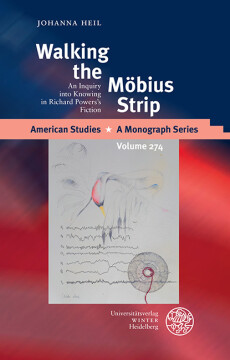
BUCH
Walking the Möbius Strip
An Inquiry into Knowing in Richard Powers’s Fiction
American Studies – A Monograph Series, Bd. 274
2016
Zusätzliche Informationen
Bibliografische Daten
Abstract
‘Walking the Möbius Strip’ locates Richard Powers’s fiction at the crossroads of postmodern and post-postmodern aesthetics and argues that this paradigm shift shapes the models of knowledge and understanding that underwrite his work. The readings of ‘Plowing the Dark’, ‘Galatea 2.2’, and ‘The Echo Maker’ are inspired by Jacques Lacan’s image of cognition as a Möbius strip on which different forms of propositional and non-propositional knowledge bleed into and depend upon one another. Drawing on feminist epistemology and psychoanalysis, this study highlights Powers’s interest in the non-propositional aspects of cognition, that is, in all that escapes the frameworks of scientific empiricism and can only be known through the mediation of fictional narrative. It reveals a deep dissatisfaction in the novels with the suggestion that knowledge and understanding must be objective and rational, and elucidates Powers’s idea that fiction can be a powerful tool for integrating various kinds of knowledge.
Inhaltsverzeichnis
| Zwischenüberschrift | Seite | Aktion | Preis |
|---|---|---|---|
| Cover | C | ||
| Title Page | iii | ||
| Copyright | iv | ||
| Table of Contents | v | ||
| AcknowledgmentsOne | vii | ||
| Abbreviations of Richard Powers’s Works | xi | ||
| 1. Knowledge in/and Richard Powers’s Fiction: An Introduction | 1 | ||
| 1.1 Powers’s Contemporary Fiction | 9 | ||
| 1.2 Narrative Knowing between Literature and Science | 21 | ||
| 2. Dimensions of Knowing: A Theoretical Framework | 29 | ||
| 2.1 (Post)Modern | 33 | ||
| 2.2 Feminist Epistemology and Implicit Understanding | 38 | ||
| 2.3 Feminisms, Psychoanalysis, and Art | 46 | ||
| 2.4 Interim: The Epistemic Value of the Work of Art | 52 | ||
| 3. Spases of Knowing: Plowing the Dark | 63 | ||
| 3.1 Narrative Strands, Lacanian Orders, and the Borromean Knot | 65 | ||
| 3.2 The Technological (Un)Conscious and Non-Human Empowerment | 98 | ||
| 3.3 Poetry Makes Something Happen | 114 | ||
| 3.4 Interim: Knowing Spaces of Representation | 128 | ||
| 4. Bodies of Knowing: Galatea 2.2 | 133 | ||
| 4.1 Writing Life in Fiction | 136 | ||
| 4.2 Testing the Knowledge of Fiction | 146 | ||
| 4.3 Embodied Knowing: Mastery, Empowerment, and Gendered Machines | 172 | ||
| 4.4 Interim: Authoring Embodied Understanding | 194 | ||
| 5. Delusions of Knowledge: The Echo Maker | 199 | ||
| 5.1 Capgras Syndrome as a Cultural Text of Illness and Memory | 202 | ||
| 5.2 Narrating Viable and Unreliable Echoes | 211 | ||
| 5.3 The Self That Is Not One: Of Doubles and Doublings | 226 | ||
| 5.4 Interim: Deluding Knowledges | 248 | ||
| 6. Novels of Knowing: Coda | 251 | ||
| Bibliography | 257 | ||
| Back Cover | Back C |


 Powered by CloudPublish
Powered by CloudPublish